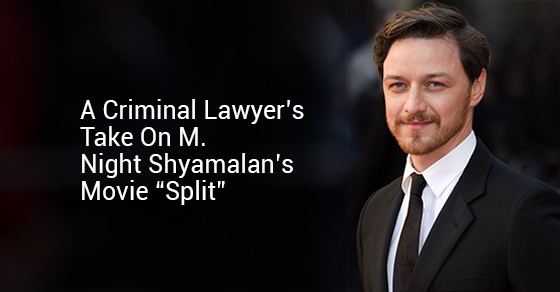A Criminal Lawyer’s Take on M. Night Shyamalan’s Movie “Split”

(Warning: Spoiler Alert!) Imagine sitting in a car, waiting for the driver to finish putting things in the trunk, when all of a sudden a stranger pops in and sprays you with an unknown substance, causing you to black out immediately. When you finally regain consciousness, you find yourself in a strange and secluded dungeon, unable to discern how you arrived and who brought you there. This was the fate of three teenage girls in M. Night Shyamalan’s newest thriller “Split” (click here to see the trailer).
The film centred on uncovering the motives behind the abductor’s actions and the girls’ attempts to make their escape. The audience quickly learns that the kidnapper, named Kevin, suffers from dissociative identity disorder, which causes him to exhibit 24 different personalities. In essence, 24 individuals live in the mind of Kevin, each erratically getting their chance to control his body. The personalities are varied in gender, age and persona. There are three prominent characters inside Kevin, namely Hedwig (a 9-year-old boy), Patricia (a stern woman), and Dennis (a perfectionist).
After undergoing significant physical and sexual abuse during his childhood, Kevin developed split personalities in order to cope with the trauma. According to Dr. Fletcher, Kevin’s psychiatrist, the minds of those with dissociative identity disorder can be so powerful that it can cause the body to change its chemical makeup so that it coincides with the particular personality in control. This ability allows a dormant and dangerous personality to materialize, known as the Beast. Hedwig, Patricia and Dennis all collude with one another so that Kevin can transform into the Beast and fulfill his ultimate purpose – to rid the world of those who are “unworthy”. These characters believe that individuals who have not suffered from trauma do not deserve to live. It is not until the end of the film where the audience realizes that the reason for the kidnapping was literally to feed the Beast, as two of the “unworthy” girls are devoured. At its core, this philosophy is intended to empower individuals that have been subjected to abuse, to allow them to take back control, albeit in a destructive way. Consequently, one of the teenage girls is spared from the Beast’s wrath, as he learns from the markings on the girl’s body that she had also been sexually abused in the past.
Inner conflict is something that many people experience, however for individuals with dissociative identity disorder, this battle is markedly difficult. Throughout the film, Kevin struggles to keep the Beast submerged. Therefore, the movie illustrates how people with mental illness can sometimes commit acts which they know are wrong but are unable to prevent. At the end of the film, Kevin is on the run as the police are searching for him in order to arrest him for the various crimes he committed, namely kidnapping, murder, etc. If this fictional story was real and had taken place in Canada, the criminal justice system would treat Kevin quite differently from other offenders as a result of his mental illness.
Section 16(1) of the Criminal Code of Canada states that a person is not criminally responsible if their mental disorder prevents them from appreciating the quality and nature of an act or omission or knowing that the act or omission is wrong. “Appreciating” and “knowing” are two distinct concepts. Knowing requires that a person have a basic awareness of something. On the other hand, appreciation goes beyond mere recognition; it requires the person to analyse the experience in some sort of way. Not all individuals with personality disorders are able to use the defence of not criminally responsible. They must satisfy the court that their disorder made them incapable of knowing that the act they committed was something that they ought not to have done.
In the case of Kevin, it is likely that he could use the defence of not criminally responsible on account of mental disorder for the crimes he committed. Kevin’s split personalities rendered him incapable of knowing that his actions were morally and legally wrong. His goal to uplift the broken, that is people who are abused, and punish individuals that have been free from such trauma, caused him to become delusional. He was unable to understand that his behaviour defies every day moral standards of society. A jury will only consider a verdict of not criminally responsible if they are satisfied that the accused committed the acts he is charged with beyond a reasonable doubt. If the court finds that Kevin is not criminally responsible, a disposition will be made to decide where he should be placed (usually a psychiatric facility), taking into account several factors such as the need to protect the public, the needs of the accused, etc. Although Kevin is but a fictional character in the movie Split, his personal struggle to gain control over his mind and remain in touch with reality represents a battle that many people with mental disorders face.

